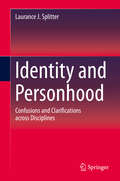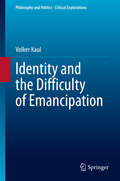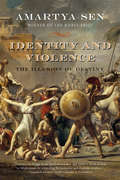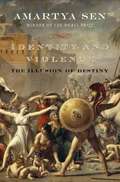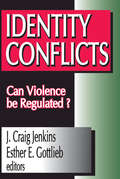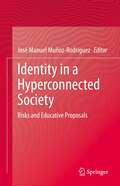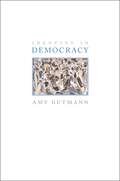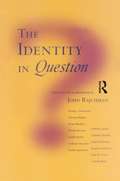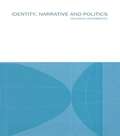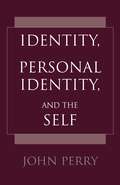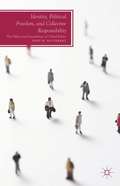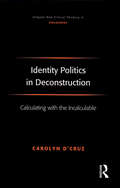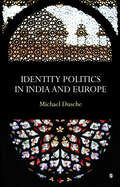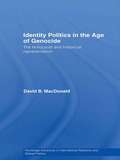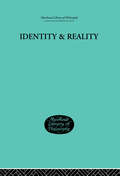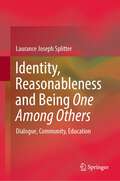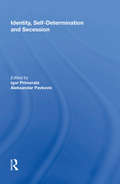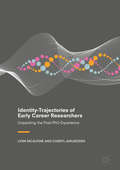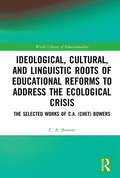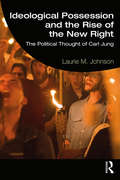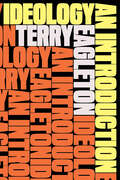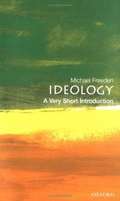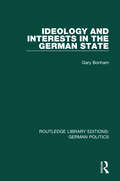- Table View
- List View
Identity and Justice
by Ian AngusIn this provocative study of the task of English-Canadian philosophy, Ian Angus contends that English Canada harbours a secret and unofficial dream of self-rule that is revealed through critiques of empire. Looking at the main tensions between local dwelling and the globalized market, Identity and Justice shows how contemporary society's reactions to technological advances and a world market economy have produced increasingly isolated individuals and prevented the emergence of a coherent community based on a universalizing philosophy.Stressing the importance of regionalism and postcolonial understandings, Angus argues that Canada requires a philosophy of independent parts through a conception of universality that subordinates rulership to a negotiation between diverse communities. Through discussion of the work of prominent Canadian thinkers, notably Harold Innis, John Porter, George Grant, and Marshall McLuhan, Angus identifies and explores key themes that define the distinctiveness of English Canada, primarily those related to power and empire, dominant and innovative modes of perception and thought, transportation, communication, community, ethnicity, and collective action.A penetrating examination of some of Canada's national myths and the phenomenology of locality in the twenty-first century, Identity and Justice is a groundbreaking critique and recovery of English Canadian social and political thought.
Identity and Personhood
by Laurance J. SplitterThis book approaches the concept of identity from both logical-linguistic and socio-cultural perspectives, and explores its implications for our understanding of who or what we persons really are. In the process, it bridges disciplines that often remain disconnected - most notably analytic philosophy and the social sciences - and offers a novel critique of citizenship and moral education, "identity politics", and other contemporary domains of inquiry. Although the book has a multi-disciplinary focus, it is philosophical in its overall orientation (but accessible to readers from outside philosophy) and educational in its mission (but of interest to readers who are not formally educators). Chapters 2-5 discuss the philosophical and (where appropriate) scientific dimensions of identity, chapters 6-7 explore its socio-cultural dimensions and chapter 8 examines its educational dimensions and implications. The book will be of particular interest to those researching or teaching civics, citizenship education and moral education, as well as those involved in cultural, political and religious studies in a broader sense. It will also appeal to anyone who finds him- or herself wondering about the state of the world in the Twenty-First Century, and who suspects that rethinking what it means to be a person in that world might not be a bad idea.
Identity and the Difficulty of Emancipation (Philosophy and Politics - Critical Explorations #13)
by Volker KaulThis book provides a comprehensive account of the phenomenon of identity in politics, featuring for the first time the question of individual emancipation. It addresses the burning questions of our times, viz. nationalism, populism, Islamic fundamentalism, multiculturalism, postsecularism and postcolonialism. The volume repudiates an easy reconciliation between identity and emancipation, such as it occurs in contemporary liberal and multicultural political theories. It shows that we cannot achieve emancipation without Kant’s help, whereas identity relentlessly draws us back to collective values and the community. The book urges for a new understanding of identity and a politics that instead of accommodating identities seeks to govern them. Identity is the buzzword in the humanities and social sciences, but also the most contentious and least conceptualized term. This book intends to bring theoretical clarity into the debate on how identity plays out in politics.
Identity and Violence: The Illusion of Destiny (Issues of Our Time)
by Amartya Sen"One of the few world intellectuals on whom we may rely to make sense out of our existential confusion."--Nadine Gordimer In this sweeping philosophical work, Amartya Sen proposes that the murderous violence that has riven our society is driven as much by confusion as by inescapable hatred. Challenging the reductionist division of people by race, religion, and class, Sen presents an inspiring vision of a world that can be made to move toward peace as firmly as it has spiraled in recent years toward brutality and war.
Identity and Violence: The Illusion of Destiny
by Amartya SenThe 1998 Nobel Laureate in economics, Sen (Harvard U.) responds to what he calls the appalling effects of the miniaturization of people. This happens, he explains, when in order to stop violence, people are reduced to a single identity--for example a moderate Shi'ite or a Hindu nationalist--that authorities believe they can address without considering all the other dimensions of reality each person occupies. Annotation ©2006 Book News, Inc., Portland, OR (booknews.com)
Identity Conflicts: Can Violence be Regulated?
by Esther GottliebSocial conflicts are ubiquitous and inherent in organized social life. This volume examines the origins and regulation of violent identity conflicts. It focuses on the regulation of conflict: the constraining, directing, and repression of violence through institutional rules and understandings. The core question the authors address is how violence is regulated and the social and political consequences of such regulation. The contributors provide a multidisciplinary multi-regional analysis of identity conflicts and their regulation. The chapters focus on the forging and suppression of religious and ethnic identities, problematic national identities, the recreation of identity in post-conflict peace-building efforts, and the forging of collective identities in the process of democratic state building. The instances of violent conflict treated here range across the globe from Central and South America, to Asia, to the Balkans, and to the Islamic world. One of the key findings is that conflicts involving religious, ethnic, or national identity are inherently more violence prone and require distinctive methods of regulation. Identity is a question both of power and of integrity. This means that both material and symbolic needs must be addressed in order to constrain or regulate these conflicts. Accordingly, some chapters draw on a political-economy approach that places primary emphasis on resources, organization, and interests, while others develop a cultural approach focusing on how identities are constructed, grievances defined, blame attributed, and redress articulated. This volume offers new ideas about the regulation of identity conflicts, at both the global and local level, that engage both tradition and modernization. It will be of interest to policymakers, political scientists, human rights activists, historians, and anthropologists.
Identity in a Hyperconnected Society: Risks and Educative Proposals
by José Manuel Muñoz-RodríguezThis book is about the formation of identity, primarily in adolescents, and the danger inherent in creating that identity in the context of a hyperconnected world. It provides scientific and regulatory pedagogical knowledge associated with these risks in creating identity, primarily among young people, arising from increasing, and increasingly important, screen connection times. It proposes solutions to the educational challenges of constructing identity in a hyperconnected society. The book focuses especially on the process of identity formation in this instance, where both adolescents and the adults who teach them have forgotten the vital need to incorporate educational theories and principles, novel, experimental and basic, kn any discussion of adolescent identity work.
Identity in Democracy
by Amy GutmannWritten by one of America's leading political thinkers, this is a book about the good, the bad, and the ugly of identity politics.Amy Gutmann rises above the raging polemics that often characterize discussions of identity groups and offers a fair-minded assessment of the role they play in democracies. She addresses fundamental questions of timeless urgency while keeping in focus their relevance to contemporary debates: Do some identity groups undermine the greater democratic good and thus their own legitimacy in a democratic society? Even if so, how is a democracy to fairly distinguish between groups such as the KKK on the one hand and the NAACP on the other? Should democracies exempt members of some minorities from certain legitimate or widely accepted rules, such as Canada's allowing Sikh members of the Royal Canadian Mounted Police to wear turbans instead of Stetsons? Do voluntary groups like the Boy Scouts have a right to discriminate on grounds of sexual preference, gender, or race? Identity-group politics, Gutmann shows, is not aberrant but inescapable in democracies because identity groups represent who people are, not only what they want--and who people are shapes what they demand from democratic politics. Rather than trying to abolish identity politics, Gutmann calls upon us to distinguish between those demands of identity groups that aid and those that impede justice. Her book does justice to identity groups, while recognizing that they cannot be counted upon to do likewise to others. Clear, engaging, and forcefully argued, Amy Gutmann's Identity in Democracy provides the fractious world of multicultural and identity-group scholarship with a unifying work that will sustain it for years to come.
The Identity in Question
by John RajchmanFirst published in 1996. Routledge is an imprint of Taylor & Francis, an informa company.
Identity, Narrative and Politics
by Maureen WhitebrookIdentity, Narrative and Politics argues that political theory has barely begun to develop a notion of narrative identity; instead the book explores the sophisticated ideas which emerge from novels as alternative expressions of political understanding. This title uses a broad international selection of Twentieth Century English language works, by writers such as Nadine Gordimer and Thomas Pynchon.The book considers each novel as a source of political ideas in terms of content, structure, form and technique.The book assumes no prior knowledge of the literature discussed, and will be fascinating reading for students of literature, politics and cultural studies.
Identity, Personal Identity and the Self
by John PerryThis volume collects a number of Perry's classic works on personal identity as well as four new pieces, The Two Faces of Identity,Persons and Information,Self-Notions and The Self, and The Sense of Identity. Perry's Introduction puts his own work and that of others on the issues of identity and personal identity in the context of philosophical studies of mind and language over the past thirty years.
Identity, Political Freedom, and Collective Responsibility
by Eddy M. SouffrantEddy M. Souffrant calls for a reassessment of the starting points of moral, social, and political philosophy that takes into account the actual living circumstances of persons living the 21st century.
Identity Politics in Deconstruction: Calculating with the Incalculable (Ashgate New Critical Thinking in Philosophy)
by Carolyn D'CruzIdentity politics dominates the organisation of liberation movements today. This is the case whether fighting over one's birthright to a nation, such as in the Palestinian/Israeli conflict; lobbying for civil rights, such as in gay and lesbian campaigns for marriage; or struggling for citizenry recognition as currently experienced by asylum seekers. In this book Carolyn D'Cruz investigates the nexus between what David Birch describes as ’the seemingly impossible of high theory and the seemingly accessible possibilities of popular discourse’, as encountered in liberation movements based on identity. D'Cruz reworks the logic of such movements through the unique combination of Derridean deconstruction, Foucauldian discourse and Levinasian ethics. Moving both within and between the domains of philosophy, politics and ’postmodern culture’ this book offers both a clear explication of complex philosophical issues and an understanding of how they relate to the political practicalities of everyday life.
Identity Politics in India and Europe
by Michael DuscheThis book highlights the present perceptions of the East and the West as seen through the eyes of eminent scholars from India, and in doing so, theorises on identity politics. Identity Politics in India and Europe combines qualitative methods (20 interviews) with historical and philosophical analysis. The first part of the book discusses the history of perceptions between the Europe of Latin Christianity and the so-called Muslim world, starting from the 7th century onwards. The second part is devoted to a discussion on the emergence of modernity and how it changed the identity politics of earlier times. The third part explores the role that intellectual elites have to play. It comprises interviews of eminent scholars and thinkers in India such as Imtiaz Ahmad and Ashis Nandy. These make for an insightful read, especially as subtle ideological differences surface in their responses to a set of common questions. The interviews are set in the historical context of the relations between Europe and the Muslim world and analysed from a theoretical angle, drawing from theories of modernity, conceptions of justice and notions of identity politics. The book will be of great interest to the world of social science academia, especially those with specific interest in the history of transnational politics.
Identity Politics in the Age of Genocide: The Holocaust and Historical Representation (Routledge Advances in International Relations and Global Politics #Vol. 64)
by David B. MacDonaldIn an era of globalization and identity politics, this book explores how Holocaust imagery and vocabulary have been appropriated and applied to other genocides. The author examines how the Holocaust has impacted on other ethnic and social groups, asking whether the Holocaust as a symbol is a useful or destructive means of reading non-Jewish history. This volume: explains the rise of the Holocaust as a gradual process, charting how its importance as a symbol has evolved, providing a theoretical framework to understand how and why non-Jewish groups choose to invoke ‘holocausts’ to apply to other events explores the Holocaust in relation to colonialism and indigenous genocide, with case studies on America, Australia and New Zealand analyzes the Holocaust in relation to war and genocide, with case studies on the Armenian genocide, the Rape of Nanking, Serbia and the Rwandan genocide examines how the Holocaust has been used to promote animal rights. Demonstrating both the opportunities and pitfalls the Holocaust provides to non-Jewish groups who seek to represent their collective histories, this book fills a much needed gap on the use of the Holocaust in contemporary identity politics and will be of interest to students and researchers of politics, the Holocaust and genocide.
Identity & Reality
by Meyerson, EmileFirst published in 2002. Routledge is an imprint of Taylor & Francis, an informa company.
Identity, Reasonableness and Being One Among Others: Dialogue, Community, Education
by Laurance Joseph SplitterThis book brings the tools and ideas of Anglo-American analytic philosophy to bear on how we think about issues of contemporary significance, in a way that is accessible to a broad audience. While acknowledging empirical findings within the social sciences, it takes on the prescriptive task of imagining a better world, in which being citizens in a democracy means actively engaging with others. We cling to tribal affiliations which incline us to look inward and spurn those whom we deem to be “other.” And we observe the mind-numbing, herd-like impact of social (and other) media on our capacity – and that of our children – to distinguish truth and good sense from falsehood and nonsense. Such problems demand our attention as reasonable persons who both think for themselves, and deliberate in good faith with others with whom they may well disagree. The good news is that while reasonableness cannot be taken for granted, it can – indeed, it must – be nurtured and it must be taught. This book both articulates a conception of reasonableness and exemplifies a clear standard of reasonableness, with respect to the questions it raises and the author's responses to them.
Identity, Self-Determination and Secession
by Igor Primoratz Aleksandar PavkovicEngaging with a range of interconnected and highly topical issues of identity, self-determination and secession, this book examines the import and implications of 'identity claims', and looks into 'identity politics' motivated by such claims, which is becoming ever more salient in democratic and culturally and ethnically heterogeneous states. It discusses nationalism as an important component of identity of individuals and groups, and a position that generates claims of self-determination and secession on the part of ethnic and cultural groups. It also examines patriotism, which until recently seemed to be on the wane, but has undergone a dramatic revival after the terrorist attacks in the US on 11 September 2001 and the start of a global 'war on terror'. The book offers a typology of facets of patriotism, an assessment of its moral standing, and a critique of the beliefs about the patria it characteristically involves. Also discussed are topics such as political liberalism vs. 'identity liberalism', the ways a liberal society should treat nonliberal communities within it, the role of heritage and remembrance in national identity, the status of national minorities as an issue of equality, arrangements concerning indigenous peoples and intrastate autonomy as an alternative to secession, and whether secession can be a legal act. The book includes contributions by prominent philosophers and political and legal theorists from Australia, Canada, Israel, and the United States.
Identity-Trajectories of Early Career Researchers: Unpacking the Post-PhD Experience
by Lynn McAlpine Cheryl AmundsenThe book asks how we can make sense of career paths for PhD graduates, something that has rarely been systematically studied. It offers a coherent synthesis of the empirically-based insights that arose from the experiences of 48 early career researchers, who were participants in a 10-year qualitative longitudinal research program. The book has the power to inform other researchers’ conceptual and methodological approaches to the study of post-PhD career trajectories. The authors draw on the conceptual lens of ‘identity-trajectory’, which emerged from their research program, to examine the decision-making processes underpinning the careers of PhD graduates, whether contingent researchers and teachers, assistant professors within the academy or professionals elsewhere. The book highlights the role of personal agency in negotiating academic and non-academic work and careers within broader personal lives. It will be compelling reading for researchers and students working in the areas of Education and Sociology, particularly those with an interest in examining career development and decision-making.
Ideological, Cultural, and Linguistic Roots of Educational Reforms to Address the Ecological Crisis: The Selected Works of C.A. (Chet) Bowers
by C. A. BowersIn this volume C.A. (Chet) Bowers, whose pioneering work on education and environmental and sustainability issues is widely recognized and respected around the world, brings together a carefully curated selection of his seminal work on the ideological, cultural, and linguistic roots of the ecological crisis; misconceptions underlying modern consciousness; the cultural commons; a critique of technology; and educational reforms to address these pressing concerns. In the World Library of Educationalists series, international scholars themselves compile career-long collections of what they judge to be their finest pieces – extracts from books, key articles, salient research findings, major theoretical and/practical contributions – so the world can read them in a single manageable volume. Readers will be able to follow the themes and strands of their work and see their contribution to the development of a field, as well as the development of the field itself. Contributors to the series include: Michael Apple, James A. Banks, Joel Spring, William F. Pinar, Stephen J. Ball, Elliot Eisner, Howard Gardner, John Gilbert, Ivor F. Goodson, and Peter Jarvis.
Ideological Possession and the Rise of the New Right: The Political Thought of Carl Jung
by Laurie M. JohnsonPolitical theorist Laurie M. Johnson deals with Jung’s analysis of the effects of modern scientific rationalism on the development of communism, fascism and Nazism in the 20th century and applies this analysis to the rise of the New Right in the 21st century. Jung’s thought provides much needed insight into contemporary ideologies such as neoliberalism, Identitarianism and the Alt-Right. Johnson explains Jungian analytical psychology as it relates to these topics, with a chapter devoted to Jung’s views of Friedrich Nietzsche, who exemplifies the modern problem with his proclamation that God is dead, and an in-depth discussion of Jung’s views on truth and the psychological function of religion as a safeguard against deadly mass movements. She then turns to Jung’s treatment of anti-Semitism and the Nazi movement, and his views on race and racism. Johnson applies these historical insights to the current manifestations of mass psychological disruption in the clash between neoliberals and the right-wing populist and Identitarian movements on the rise in North America and Europe. She concludes by discussing the search for an authentic and meaningful life in a West that rejects extremism and is open to authentic spiritual experiences as a counterbalance to mass mindedness. Ideological Possession and the Rise of the New Right will appeal to both undergraduate and graduate students of psychology and intellectual history. The book will also be of interest to those wishing to understand the new nationalist, nativist and Identarian movements.
Ideology: An Introduction
by Terry EagletonIdeology has never before been so much in evidence as a fact, and so little understood as a concept, as it is today. In this now classic work, originally written for both students and for those already familiar with the debates around the concept, the celebrated literary theorist Terry Eagleton unravels its many definitions, exploring its tortuous history from the Enlightenment to the present.A limpid account of the thought of key Marxist thinkers, as well as that of philosophers from Schopenhauer and Nietzsche to Freud and the post-structuralists, and a political reformulation of a vital set of ideas, Ideology: An Introduction is an essential text by one of our most important contemporary critics.
Ideology: A Very Short Introduction
by Michael FreedenIdeology is one of the most controversial terms in the political vocabulary, exciting both revulsion and inspiration. This book examines the reasons for those views, and explains why ideologies deserve respect as a major form of political thinking. It investigates the centrality of ideology both as a political phenomenon and as an organizing framework of political thought and action. It explores the changing understandings of ideology as a concept, and the arguments of the main ideologies. By employing the latest insights from a range of disciplines, the reader is introduced to the vitality and force of a crucial resource at the disposal of societies, through which sense and purpose is assigned to the political world.
Ideology (Concepts Social Thought Series)
by Gregory McLellan David McLellanTo study ideology is to ask such questions as: Where do our ideas about society and politics come from? Are these ideas socially determined? <P><P>If so, what validity can they claim? In this brief yet comprehensive introduction, David McLellan examines the origins of the concept of ideology, analyzes its place in the Marxist and non-Marxist traditions, and assesses the various uses to which it has been put in recent social and political theory, particularly the connection between ideology and the "end of history" debate. <P><P>Revised and updated, this second edition is for all those who are interested in a clear presentation of the most basic concept in the philosophy of the social sciences.
Ideology and Interests in the German State (Routledge Library Editions: German Politics)
by Gary BonhamThis book addresses major theoretical issues in the fields of public administration and comparative politics. It discusses the role which ideology played as a unifying force for at least parts of the German state bureaucracy in Wilhelmine Germany . The examination of a modernizing ideology in the German case is useful for an understanding of the political dynamics of state-led modernization and industrial strategy in many contemporary societies and the author explains political behaviour and relations in Germany in general terms that are universally relevant.

